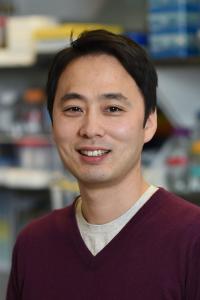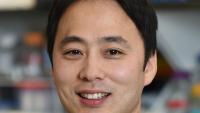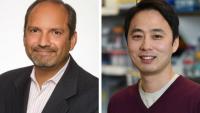Hee Won Yang, PhD
- Assistant Professor of Pathology & Cell Biology
On the web

Overview
Hee-Won Yang, PhD is an assistant professor in the Department of Pathology & Cell Biology at the Herbert Irving Comprehensive Cancer Center, Columbia University Irving Medical Center. Since establishing his laboratory in 2019, Dr. Yang’s research has been dedicated to uncovering the complex signaling mechanisms that govern cell proliferation in both normal and cancer cells, with a particular focus on cyclin-dependent kinases 4 and 6 (CDK4/6). While CDK4/6 are traditionally central to cell-cycle entry, the Yang lab recently identified a non-canonical pathway that enables cells to bypass CDK4/6 activity, facilitating continued cell-cycle progression (Kim et al., 2023, Cell Reports; Zhang et al., 2023, Nature Communications; Armand et al., 2025, eLife). In parallel, the lab demonstrated how receptor tyrosine kinase (RTK) signaling dynamics regulate cell proliferation, even in the presence of MAPK pathway inhibitors (Kim et al., 2023, Cell Reports). Currently, the Yang lab employs cutting-edge tools, including optogenetics, CRISPR screening, and multi-omics analyses, to investigate two critical areas: (1) the mechanisms governing the cellular decision of whole-genome duplication and (2) the molecular underpinnings of resistance to targeted therapies, including RAS inhibitors.
Academic Appointments
- Assistant Professor of Pathology & Cell Biology
Languages
- English
- Korean
Credentials & Experience
Education & Training
- PhD, Korea Advanced Institute of Science and Technology (KAIST), South Korea
- Postdoctoral Fellow, Stanford University, USA
Honors & Awards
- 2023 – V Scholar Grant, The V foundation
- 2023 – Research Scholar Grant, American Cancer Society
- 2022 – Career Development Award, Melanoma Research Foundation
- 2021 – Velocity Fellow, The Herbert Irving Comprehensive Cancer Center
Research
Our lab focuses on understanding how various stimuli, including growth factors, cell stress, and targeted cancer therapeutics, influence the behavior and fate of individual cells. Our goal is to understand the normal mechanistic regulations of signaling pathways that govern proliferation. We are particularly interested in determining how these signals deviate in cancerous conditions, and with this knowledge, aspire to modify the fate of individual cells. We invite you to join us on this exciting journey of discovery.
Research Interests
- Cancer Biology
- Cell biology
- Synthetic Biology
- Systems Biology
Selected Publications
(Yang lab members in bold font. *marks co-first authorship; #marks co-corresponding authorship)
- S Kim*, E Son*, H Park, M Kim, and H Yang; Dual targeting CDK4/6 and CDK7 augments tumor response and anti-tumor immunity in breast cancer (Under revision)
- K Kim, J Armand, and H Yang; E2F activity determines mitosis versus whole-genome duplication in G2-arrested cells (Under revision)
- J Armand, S Kim, E Son, M Kim, and H Yang; Therapeutic benefits of maintaining CDK4/6 inhibitors and incorporating CDK2 inhibitors beyond progression in breast cancer. eLife, (In press)
- A Shanabag, J Armand, E Son, H Yang; Targeting the cell cycle in cancer. Experimental & Molecular Medicine, (In press)
- H Yang; Investigating heterogeneous cell-cycle progression using single-cell imaging approaches. Methods Mol Biol, 2740:263-273, 2024
- M Zhang*, S Kim*, and H Yang; Non-canonical pathway for Rb inactivation and external signaling sequentially coordinate cell-cycle entry without CDK4/6 activity. Nat Comm, 14: 7847, 2023
- S Kim, J Armand, A Safonov, M Zhang, R Soni, G Schwartz, J McGuinness, H Hibshoosh, P Razavi, M Kim, S Chandarlapaty, and H Yang; Sequential activation of E2F via Rb degradation and c-Myc drives resistance to CDK4/6 inhibitors in breast cancer. Cell Reports, 42(11):113198, 2023
- S Kim, R Carvajal, M Kim, and H Yang; Kinetics of RTK activation determine ERK reactivation and resistance to dual BRAF/MEK inhibition in melanoma. Cell Reports, 42(6):112570, 2023
- S Kim, A Leong, M Kim#, and H Yang#; CDK4/6 initiates Rb inactivation and CDK2 activity coordinates cell-cycle commitment and G1/S transition. Sci Rep, 12: 16810, 2022
- H Yang*,#, S Cappell*, A Jaimovich*, C Liu, M Chung, S Regot, M Covert, and T Meyer#; Stress-mediated exit to quiescence restricted by progressively increasing persistence in CDK4/6 activation. eLife, 9, 2020
- H Yang#, M Chung, T Kudo, and T Meyer#; Competing memories of mitogen and p53 signaling control cell-cycle entry. Nature, 549: 404-408, 2017 (Cover article, Highlight in Nature, Faculty of 1000 recommended article)
- H Yang*,#, S Collins*,#, and T Meyer#; Locally excitable Cdc42 signals steer cells during chemotaxis. Nat Cell Biol, 18: 191-201, 2016 (Faculty of 1000 recommended article)
For a complete list of publications, please visit PubMed.gov

